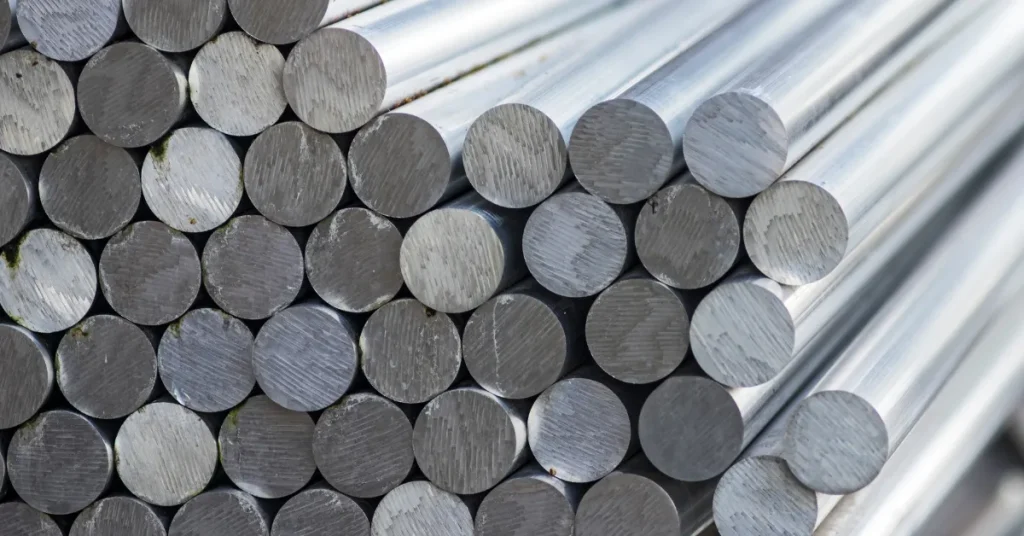18 gauge aluminum has a thickness of approximately 0.0403 inches or 1.024 millimeters. It’s crucial for buyers to know this specification when sourcing materials for projects.
Understanding the thickness of 18 gauge aluminum is essential for professionals in industries ranging from construction to crafts.
This measurement often dictates the material’s strength, weight, and flexibility, making it a key factor in determining its suitability for various applications.
Craftsmen, contractors, and DIY enthusiasts frequently encounter 18 gauge aluminum due to its moderate thickness, which offers a balance between durability and workability.
For instance, in the world of sheet metal, it’s a common choice for ductwork, flashing, and even artistic projects due to its ability to withstand bending and shaping without compromising structural integrity.
This knowledge helps ensure the right gauge is selected for performance and budget needs.

Gauging Aluminum Thickness
Understanding aluminum thickness is crucial for various projects. The thickness of aluminum is often measured in gauges. It’s essential to know how these measurements translate into millimeters or inches for your work.
The Basics Of Metal Gauge
First, let’s cover the basics. Metal gauge is a standard unit of measurement that indicates the thickness of metal sheets. A specific gauge number corresponds to a specific thickness.
However, keep in mind that as the gauge number increases, the thickness decreases in the case of most metals.
| Gauge Number | Thickness (inches) | Thickness (millimeters) |
| 18 Gauge | 0.0403″ | 1.024 mm |
For aluminum, an 18 gauge sheet measures approximately 0.0403 inches thick. That’s about 1.024 millimeters. Remember, these measurements might slightly vary based on industry standards and material type.
Comparing Aluminum Gauges
Let’s make a comparison. In contrast to other materials, aluminum gauges don’t correspond with steel gauges directly. This means an 18 gauge aluminum sheet is thicker than an 18 gauge steel sheet.
- Thicker gauges (lower numbers) are more durable and weigh more.
- Thinner gauges (higher numbers) are more flexible and weigh less.
For projects requiring sturdy, yet lightweight material, a lower aluminum gauge like 18 is often preferable. It balances the need for strength without being too heavy.
| Aluminum Gauge | Thickness (inches) | Common Uses |
| 14 Gauge | 0.0635″ | Architectural uses |
| 18 Gauge | 0.0403″ | General fabrication |
| 22 Gauge | 0.0253″ | Ductwork |
Using this information, you can select the correct gauge for your aluminum sheets, whether you’re building a lightweight frame or a robust structure.
18 Gauge Aluminum In Focus
18 gauge aluminum is a versatile material in construction and crafting.
Its thickness balances durability and pliability, making it a favorite for many projects.
Standard Measurements
The gauge system can be confusing because it doesn’t measure in inches or millimeters.
Gauge numbers are like golf scores; they get smaller as the material gets thicker.
18 gauge aluminum is roughly 0.0403 inches or 1.024 millimeters thick.
| Gauge Number | Inches | Millimeters |
| 18 | 0.0403″ | 1.024 mm |
Common Applications
18 gauge aluminum has many uses. Here are some areas where it shines:
- Automotive: Makes various car parts.
- Construction: Forms frames for structures.
- Art and Jewelry: Artists love its malleability.
- Home Projects: Ideal for DIY tasks.
Strength And Durability

Understanding the thickness of 18 gauge aluminum is critical when deliberating its applications. This gauge signifies a specific thickness that we associate with both strength and durability.
Let’s explore the key attributes that make 18 gauge aluminum a popular choice in various industries.
Tensile Strength Of 18 Gauge Aluminum
The tensile strength of a material is a measure of how much pulling force it can withstand before breaking. For 18 gauge aluminum, this is a vital factor as it determines how the material will perform under stress.
A higher tensile strength means the aluminum can handle more weight and pressure, making it a reliable option for many construction and manufacturing projects.
| Characteristic | Value |
| Thickness | 0.0403 inches or 1.024 mm |
| Tensile Strength | Varies by alloy composition |
The common alloys of 18 gauge aluminum exhibit average tensile strengths suitable for most uses, from automobile parts to building materials.
Corrosion Resistance Properties
One exceptional quality of aluminum is its corrosion resistance. This metal spontaneously forms a protective oxide layer when exposed to air, effectively shielding it from further decay.
18 gauge aluminum benefits from this property as well, which greatly enhances its longevity. Such resistance is perfect for outdoor use or in environments with high moisture levels.
- Resists rust and degradation
- Ideal for roofing, siding, and outdoor structures
- Requires minimal maintenance
When evaluating materials for their ability to last, 18 gauge aluminum stands out. Its durability ensures that products crafted from this material can withstand the elements.
This makes it an excellent choice for many applications, safeguarding investments over time. The combination of strength and anti-corrosive properties renders 18 gauge aluminum a formidable contender in material selection.
Working With 18 Gauge Aluminum

Working with 18 Gauge Aluminum presents unique opportunities for both seasoned professionals and DIY enthusiasts.
This metal’s versatility is well-suited to various projects, with a thickness often favored for its balance between pliability and strength.
At approximately 0.0403 inches or 1.024 millimeters, 18 gauge aluminum provides enough substance for robust construction without compromising ease of manipulation. Let’s dive into specifics.
Machining And Molding
When shaping 18 gauge aluminum, careful consideration ensures optimal results.
- Cutting — Use appropriate shears or nibblers for precision.
- Drilling — Employ sharp drill bits; lower speeds reduce heat.
- Bending — Apply gradual pressure to avoid cracking.
Whether for creating intricate components or custom shapes, this aluminum gauge allows for detailed work. A stable workbench and proper tools are keys to success.
Welding Considerations
Joining 18 gauge aluminum through welding demands specific techniques.
- Choose the right method: TIG or MIG welding delivers cleaner joins with less distortion.
- Control heat: Use lower amperage to prevent burn-through.
- Clean thoroughly: Prep surfaces to remove oxides and contaminants.
Protective gear and proper ventilation are non-negotiable for safety. Patience and practice lead to strong, aesthetically pleasing welds when working with this material.
Selecting The Right Aluminum Gauge
Choosing the correct thickness of aluminum is vital for your project. The gauge number of aluminum denotes its thickness.
A smaller gauge number indicates thicker aluminum. Understanding the thickness is crucial for durability and workability. Let’s explore the implications of 18 gauge aluminum.
Project-specific Requirements
Every project has unique demands. Consider these factors for 18 gauge aluminum:
- Strength: Is high strength essential? Thicker gauges offer more.
- Formability: Bending or shaping needed? Thinner gauges may be better.
- Weight: Concerned with weight? Thinner aluminum weighs less.
- Application: For roofing, sculptures, or panels, gauge matters.
Determine the gauge by reviewing these aspects. Precision ensures project success.
Comparing Costs And Benefits
Examining cost-effectiveness is important. Thicker aluminum has higher material costs. Yet, it might reduce future maintenance. Assess both material cost and longevity. Use the table below to compare:
| Gauge | Thickness (inches) | Approx. Cost | Applications |
| 18 Gauge | 0.0403 | $ | General use |
| 20 Gauge | 0.0320 | $ | Detail work |
| 22 Gauge | 0.0253 | $ | Decorative |
Consider the table for a direct comparison. Choose wisely for cost-efficiency and functionality.
FAQs About How Thick Is 18 Gauge Aluminum
Which Is Heavier 16 Or 18 Gauge Aluminum?
18 gauge aluminum is heavier than 16 gauge aluminum. The lower the gauge number, the thicker and heavier the metal is.
How Thick Is 20 Gauge Aluminum?
20 gauge aluminum typically measures 0. 032 inches, or about 0. 81 millimeters in thickness.
Is 18 Gauge Thicker?
Yes, an 18 gauge wire or sheet metal is thicker compared to higher gauges like 20 or 22 gauge.
Which Is Thicker 14 Or 16 Gauge Aluminum?
14 gauge aluminum is thicker than 16 gauge aluminum. Gauge number decreases as the thickness increases, meaning lower numbers indicate thicker metal.
Conclusion
Wrapping up, understanding 18 gauge aluminum thickness is key for numerous projects. Standing at 1. 02mm, it strikes a balance between strength and flexibility.
Perfect for DIY or professional tasks, this measurement ensures your endeavors are built on precision. Look no further for the sturdy yet adaptable material your project demands.
Resources:
1. https://www.usgs.gov/centers/national-minerals-information-center/aluminum-statistics-and-information
